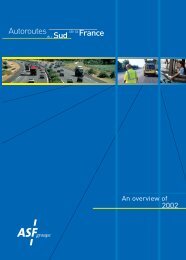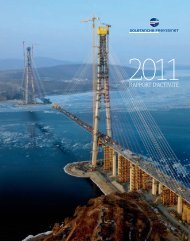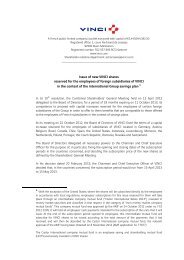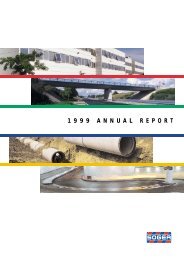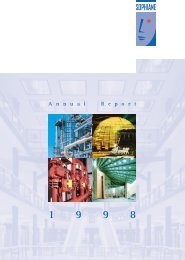VINCI - 2005 annual report
VINCI - 2005 annual report
VINCI - 2005 annual report
Create successful ePaper yourself
Turn your PDF publications into a flip-book with our unique Google optimized e-Paper software.
1.1 FIRST-TIME ADOPTION OF IFRS - METHODS APPLIED<br />
The 2004 IFRS financial information, presented for comparative purposes,<br />
has been prepared in accordance with the provisions of IFRS 1 First-time<br />
Adoption of International Financial Reporting Standards and following the IFRS stand-<br />
1.1.1 General principles<br />
<strong>VINCI</strong> has applied the accounting policies in force at the balance sheet<br />
date of its first IFRS financial statements (31 December <strong>2005</strong>) retrospec-<br />
1.1.2 Elections made by <strong>VINCI</strong><br />
IFRS 1 provides for the retrospective application of standards, with the<br />
exception of certain obligatory provisions and some limited exemptions.<br />
<strong>VINCI</strong> has made the following elections:<br />
Retirement benefit obligations: the actuarial gains and losses existing at<br />
1 January 2004, not recognised under French GAAP, are recorded under<br />
provisions for retirement benefit obligations with a corresponding reduction<br />
of equity. Actuarial gains and losses arising after 1 January 2004 are<br />
recognised prospectively.<br />
Translation gains and losses in relation to a foreign entity: <strong>VINCI</strong> has<br />
elected to reclassify cumulative translation gains and losses at 1 January<br />
2004 under consolidated reserves. This reclassification has no impact on<br />
the total amount of equity. The new IFRS amount of translation gains and<br />
differences is therefore taken to zero at 1 January 2004. If these subsidiaries<br />
CONSOLIDATED FINANCIAL STATEMENTS<br />
tively to its opening balance sheet at 1 January 2004, as if these standards<br />
had always been applied.<br />
are subsequently disposed of, the disposal gain or loss will not include the<br />
reversal of translation gains and losses prior to 1 January 2004 but will<br />
however include those recognised after that date.<br />
Business combinations: <strong>VINCI</strong> has elected not to restate, as provided by<br />
IFRS 3, business combinations prior to 1 January 2004.<br />
Property, plant and equipment and intangible assets: <strong>VINCI</strong> has elected<br />
not to measure certain items of property, plant and equipment and intangible<br />
assets at the transition date at their fair value.<br />
Share-based payments: <strong>VINCI</strong> has elected to apply IFRS 2 in respect of<br />
share option plans granted since 7 November 2002 for which rights had<br />
not yet vested at 1 January <strong>2005</strong>.<br />
1.2 IFRS STANDARDS OR PROJECTS IN PROGRESS FOR WHICH EARLY<br />
APPLICATION IS POSSIBLE FROM <strong>2005</strong><br />
<strong>VINCI</strong>’s financial statements at 31 December <strong>2005</strong> do not include the<br />
possible impacts of:<br />
– standards and interpretations published at 31 December <strong>2005</strong> but of<br />
which application is only compulsory for periods starting on or after 1<br />
January 2006;<br />
1.2.1 Draft interpretations relating to concession contracts<br />
In March <strong>2005</strong>, the IFRIC published three draft interpretations relating to<br />
the accounting treatment of concession contracts (drafts D12, D13 and<br />
D14), which are still under discussion:<br />
– the first draft defines the application scope of concession contracts and<br />
the criteria for determining the accounting model to apply. The application<br />
scope covers public service concession contracts in which the<br />
concession grantor is considered to exercise control over the assets operated.<br />
The method of remunerating the concession operator is the only<br />
criterion adopted, at present, for determining the nature of the assets to<br />
ards applicable at 1 January 2004, as endorsed for the preparation of<br />
financial statements for the period ending 31 December <strong>2005</strong>.<br />
In order to explain the effects of the transition to IFRS on the 2004 financial information, sections H and I of the Notes describe the main impacts of the<br />
transition on equity at 1 January 2004 and 31 December 2004, and on the balance sheet, income statement and cash flow statement for 2004.<br />
– draft IFRIC interpretations on the accounting treatment of concession<br />
contracts.<br />
be recognised in the balance sheet and the resulting accounting treatment.<br />
– the other two drafts deal with the two accounting models proposed:<br />
- the intangible asset model: the asset under concession would be<br />
recognised as an intangible asset whenever the concession operator is<br />
paid directly by the users.<br />
This asset is considered as being a right to receive tolls, granted to the<br />
concession operator in consideration for financing and constructing<br />
the infrastructure. This treatment would apply to most infrastructure<br />
concessions that are today managed by <strong>VINCI</strong>, in particular Cofiroute’s<br />
197





